[PDF] Contemporary Hospitality Industry - Assignment
VerifiedAdded on 2021/01/02
|9
|2223
|117
AI Summary
Contribute Materials
Your contribution can guide someone’s learning journey. Share your
documents today.
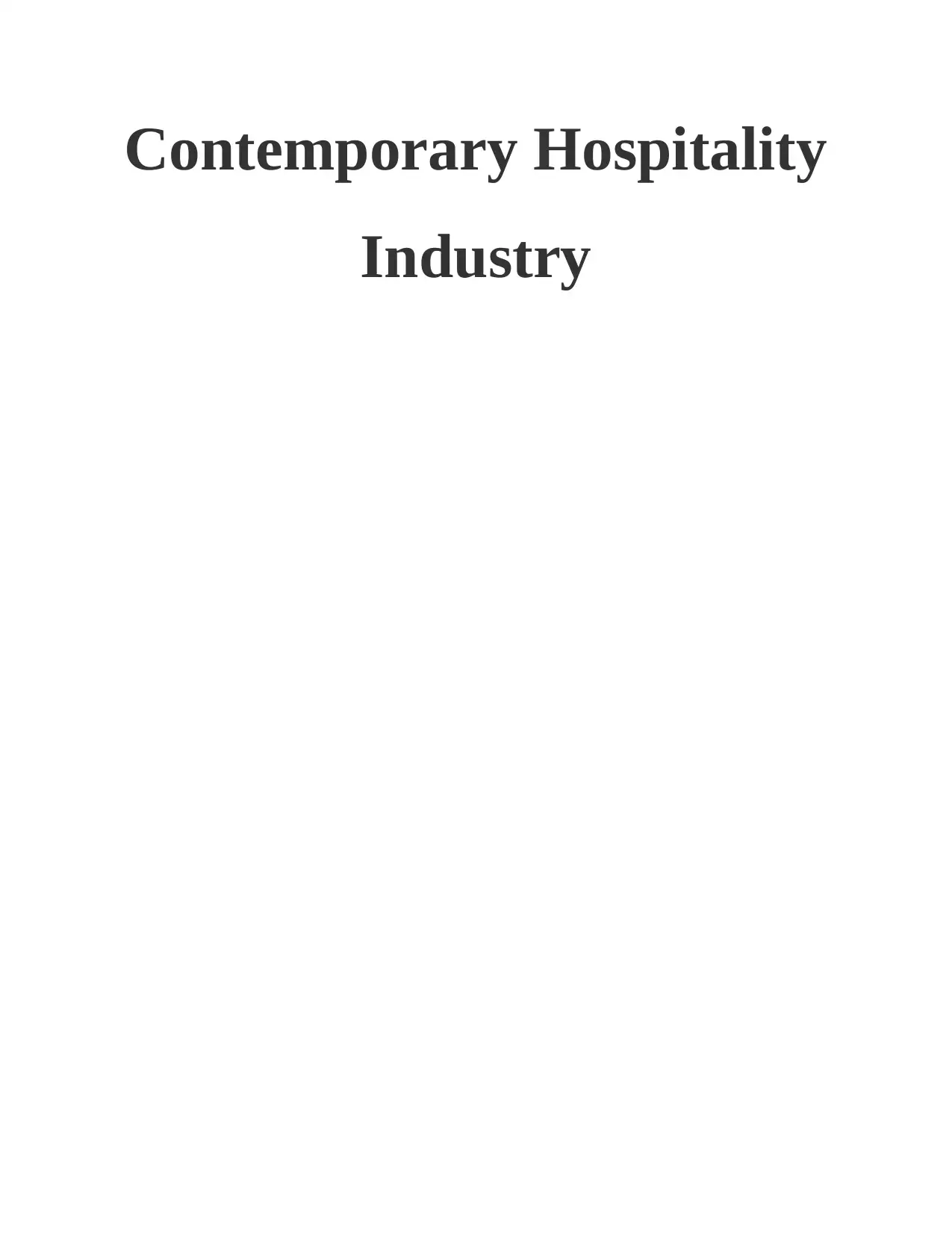
Contemporary Hospitality
Industry
Industry
Secure Best Marks with AI Grader
Need help grading? Try our AI Grader for instant feedback on your assignments.
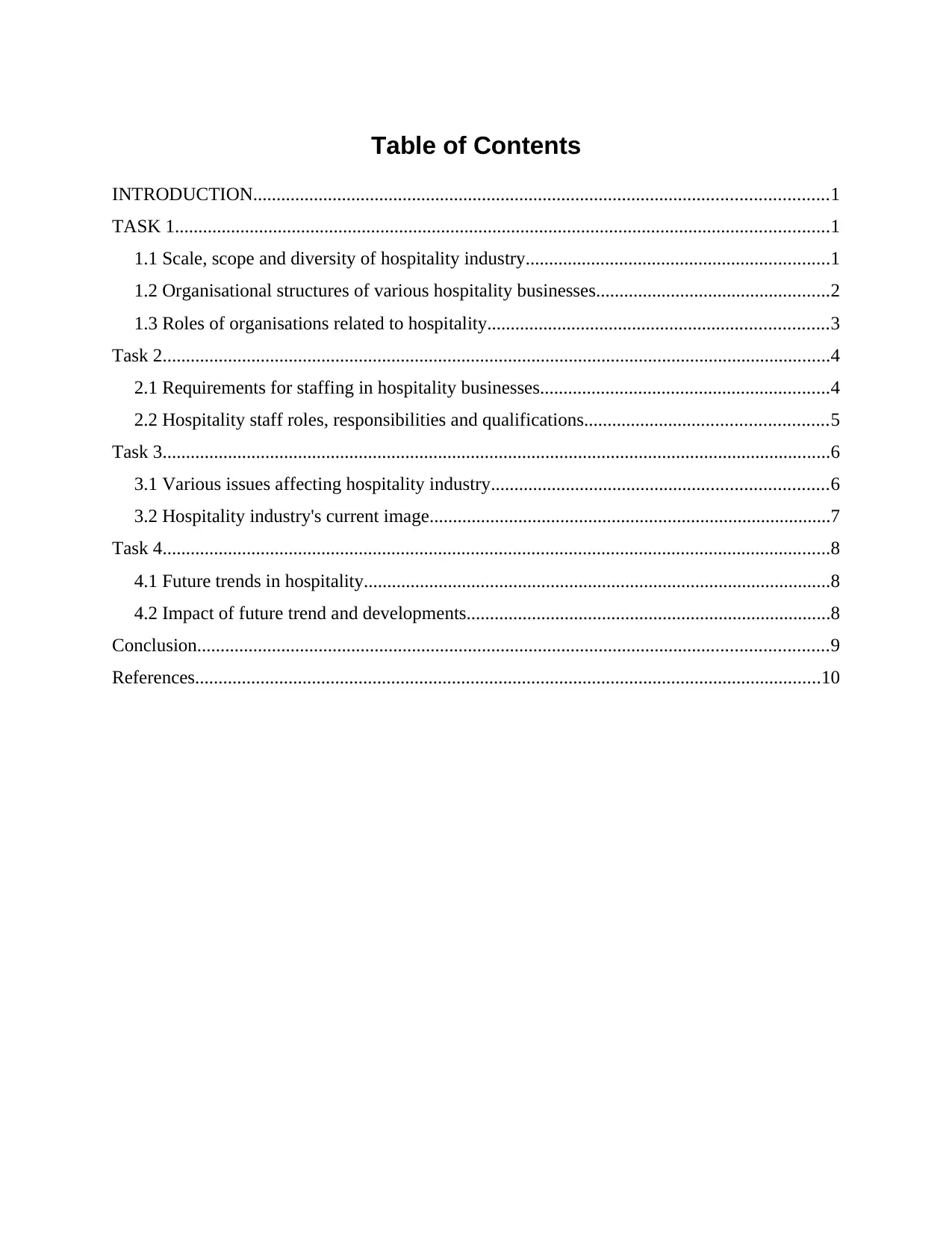
Table of Contents
INTRODUCTION...........................................................................................................................1
TASK 1............................................................................................................................................1
1.1 Scale, scope and diversity of hospitality industry.................................................................1
1.2 Organisational structures of various hospitality businesses..................................................2
1.3 Roles of organisations related to hospitality.........................................................................3
Task 2...............................................................................................................................................4
2.1 Requirements for staffing in hospitality businesses..............................................................4
2.2 Hospitality staff roles, responsibilities and qualifications....................................................5
Task 3...............................................................................................................................................6
3.1 Various issues affecting hospitality industry........................................................................6
3.2 Hospitality industry's current image......................................................................................7
Task 4...............................................................................................................................................8
4.1 Future trends in hospitality....................................................................................................8
4.2 Impact of future trend and developments..............................................................................8
Conclusion.......................................................................................................................................9
References......................................................................................................................................10
INTRODUCTION...........................................................................................................................1
TASK 1............................................................................................................................................1
1.1 Scale, scope and diversity of hospitality industry.................................................................1
1.2 Organisational structures of various hospitality businesses..................................................2
1.3 Roles of organisations related to hospitality.........................................................................3
Task 2...............................................................................................................................................4
2.1 Requirements for staffing in hospitality businesses..............................................................4
2.2 Hospitality staff roles, responsibilities and qualifications....................................................5
Task 3...............................................................................................................................................6
3.1 Various issues affecting hospitality industry........................................................................6
3.2 Hospitality industry's current image......................................................................................7
Task 4...............................................................................................................................................8
4.1 Future trends in hospitality....................................................................................................8
4.2 Impact of future trend and developments..............................................................................8
Conclusion.......................................................................................................................................9
References......................................................................................................................................10
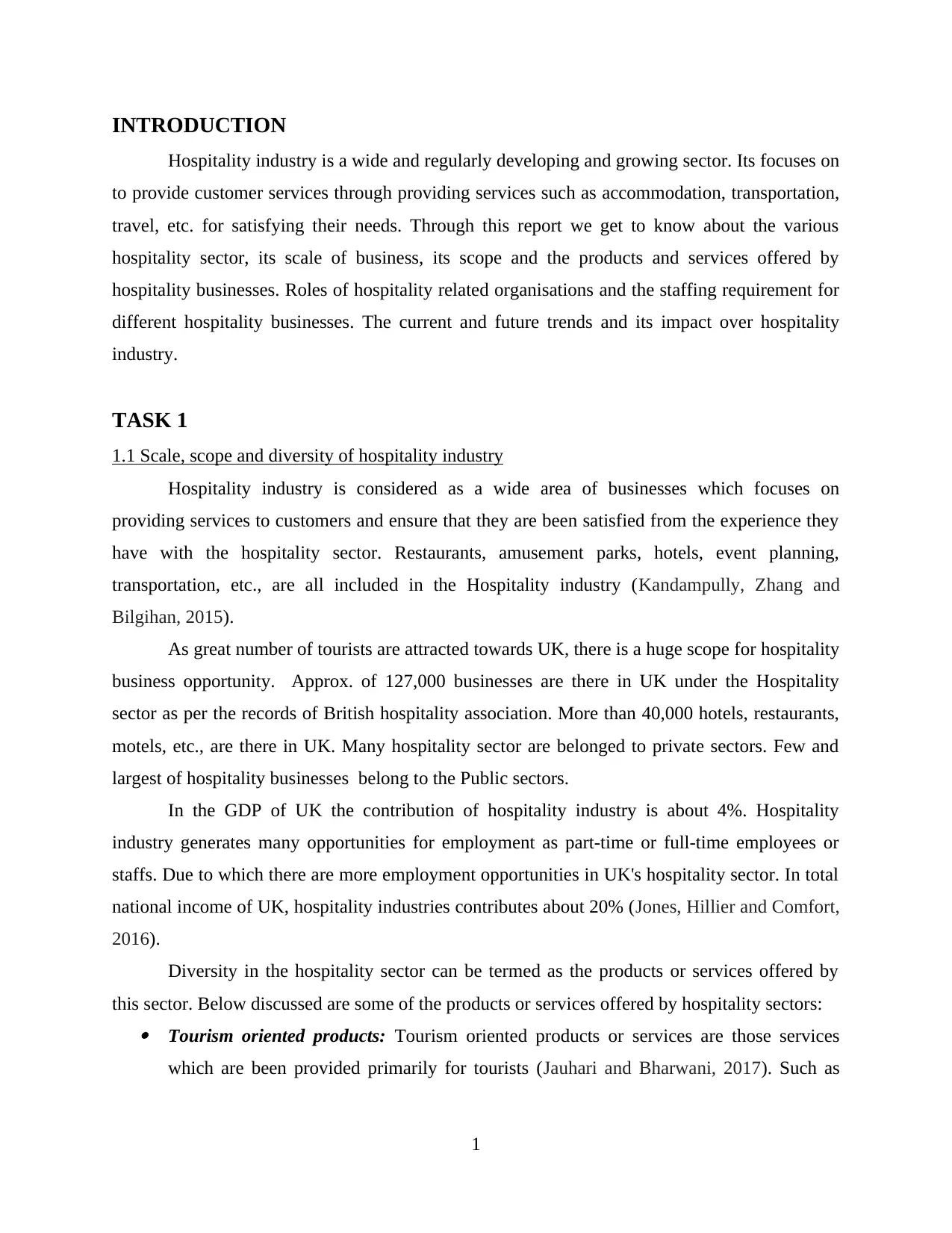
INTRODUCTION
Hospitality industry is a wide and regularly developing and growing sector. Its focuses on
to provide customer services through providing services such as accommodation, transportation,
travel, etc. for satisfying their needs. Through this report we get to know about the various
hospitality sector, its scale of business, its scope and the products and services offered by
hospitality businesses. Roles of hospitality related organisations and the staffing requirement for
different hospitality businesses. The current and future trends and its impact over hospitality
industry.
TASK 1
1.1 Scale, scope and diversity of hospitality industry
Hospitality industry is considered as a wide area of businesses which focuses on
providing services to customers and ensure that they are been satisfied from the experience they
have with the hospitality sector. Restaurants, amusement parks, hotels, event planning,
transportation, etc., are all included in the Hospitality industry (Kandampully, Zhang and
Bilgihan, 2015).
As great number of tourists are attracted towards UK, there is a huge scope for hospitality
business opportunity. Approx. of 127,000 businesses are there in UK under the Hospitality
sector as per the records of British hospitality association. More than 40,000 hotels, restaurants,
motels, etc., are there in UK. Many hospitality sector are belonged to private sectors. Few and
largest of hospitality businesses belong to the Public sectors.
In the GDP of UK the contribution of hospitality industry is about 4%. Hospitality
industry generates many opportunities for employment as part-time or full-time employees or
staffs. Due to which there are more employment opportunities in UK's hospitality sector. In total
national income of UK, hospitality industries contributes about 20% (Jones, Hillier and Comfort,
2016).
Diversity in the hospitality sector can be termed as the products or services offered by
this sector. Below discussed are some of the products or services offered by hospitality sectors: Tourism oriented products: Tourism oriented products or services are those services
which are been provided primarily for tourists (Jauhari and Bharwani, 2017). Such as
1
Hospitality industry is a wide and regularly developing and growing sector. Its focuses on
to provide customer services through providing services such as accommodation, transportation,
travel, etc. for satisfying their needs. Through this report we get to know about the various
hospitality sector, its scale of business, its scope and the products and services offered by
hospitality businesses. Roles of hospitality related organisations and the staffing requirement for
different hospitality businesses. The current and future trends and its impact over hospitality
industry.
TASK 1
1.1 Scale, scope and diversity of hospitality industry
Hospitality industry is considered as a wide area of businesses which focuses on
providing services to customers and ensure that they are been satisfied from the experience they
have with the hospitality sector. Restaurants, amusement parks, hotels, event planning,
transportation, etc., are all included in the Hospitality industry (Kandampully, Zhang and
Bilgihan, 2015).
As great number of tourists are attracted towards UK, there is a huge scope for hospitality
business opportunity. Approx. of 127,000 businesses are there in UK under the Hospitality
sector as per the records of British hospitality association. More than 40,000 hotels, restaurants,
motels, etc., are there in UK. Many hospitality sector are belonged to private sectors. Few and
largest of hospitality businesses belong to the Public sectors.
In the GDP of UK the contribution of hospitality industry is about 4%. Hospitality
industry generates many opportunities for employment as part-time or full-time employees or
staffs. Due to which there are more employment opportunities in UK's hospitality sector. In total
national income of UK, hospitality industries contributes about 20% (Jones, Hillier and Comfort,
2016).
Diversity in the hospitality sector can be termed as the products or services offered by
this sector. Below discussed are some of the products or services offered by hospitality sectors: Tourism oriented products: Tourism oriented products or services are those services
which are been provided primarily for tourists (Jauhari and Bharwani, 2017). Such as
1
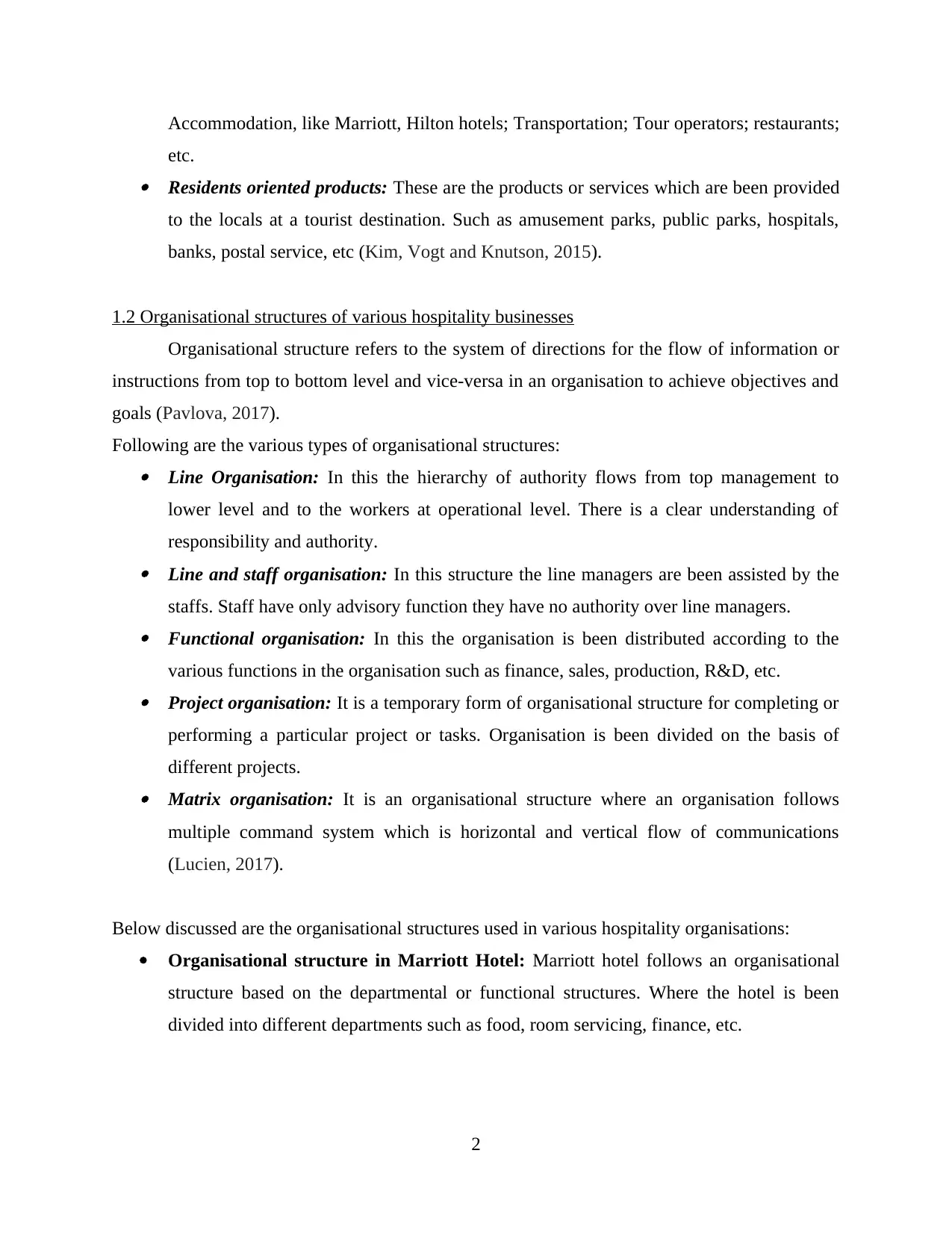
Accommodation, like Marriott, Hilton hotels; Transportation; Tour operators; restaurants;
etc. Residents oriented products: These are the products or services which are been provided
to the locals at a tourist destination. Such as amusement parks, public parks, hospitals,
banks, postal service, etc (Kim, Vogt and Knutson, 2015).
1.2 Organisational structures of various hospitality businesses
Organisational structure refers to the system of directions for the flow of information or
instructions from top to bottom level and vice-versa in an organisation to achieve objectives and
goals (Pavlova, 2017).
Following are the various types of organisational structures: Line Organisation: In this the hierarchy of authority flows from top management to
lower level and to the workers at operational level. There is a clear understanding of
responsibility and authority. Line and staff organisation: In this structure the line managers are been assisted by the
staffs. Staff have only advisory function they have no authority over line managers. Functional organisation: In this the organisation is been distributed according to the
various functions in the organisation such as finance, sales, production, R&D, etc. Project organisation: It is a temporary form of organisational structure for completing or
performing a particular project or tasks. Organisation is been divided on the basis of
different projects. Matrix organisation: It is an organisational structure where an organisation follows
multiple command system which is horizontal and vertical flow of communications
(Lucien, 2017).
Below discussed are the organisational structures used in various hospitality organisations:
Organisational structure in Marriott Hotel: Marriott hotel follows an organisational
structure based on the departmental or functional structures. Where the hotel is been
divided into different departments such as food, room servicing, finance, etc.
2
etc. Residents oriented products: These are the products or services which are been provided
to the locals at a tourist destination. Such as amusement parks, public parks, hospitals,
banks, postal service, etc (Kim, Vogt and Knutson, 2015).
1.2 Organisational structures of various hospitality businesses
Organisational structure refers to the system of directions for the flow of information or
instructions from top to bottom level and vice-versa in an organisation to achieve objectives and
goals (Pavlova, 2017).
Following are the various types of organisational structures: Line Organisation: In this the hierarchy of authority flows from top management to
lower level and to the workers at operational level. There is a clear understanding of
responsibility and authority. Line and staff organisation: In this structure the line managers are been assisted by the
staffs. Staff have only advisory function they have no authority over line managers. Functional organisation: In this the organisation is been distributed according to the
various functions in the organisation such as finance, sales, production, R&D, etc. Project organisation: It is a temporary form of organisational structure for completing or
performing a particular project or tasks. Organisation is been divided on the basis of
different projects. Matrix organisation: It is an organisational structure where an organisation follows
multiple command system which is horizontal and vertical flow of communications
(Lucien, 2017).
Below discussed are the organisational structures used in various hospitality organisations:
Organisational structure in Marriott Hotel: Marriott hotel follows an organisational
structure based on the departmental or functional structures. Where the hotel is been
divided into different departments such as food, room servicing, finance, etc.
2
Secure Best Marks with AI Grader
Need help grading? Try our AI Grader for instant feedback on your assignments.
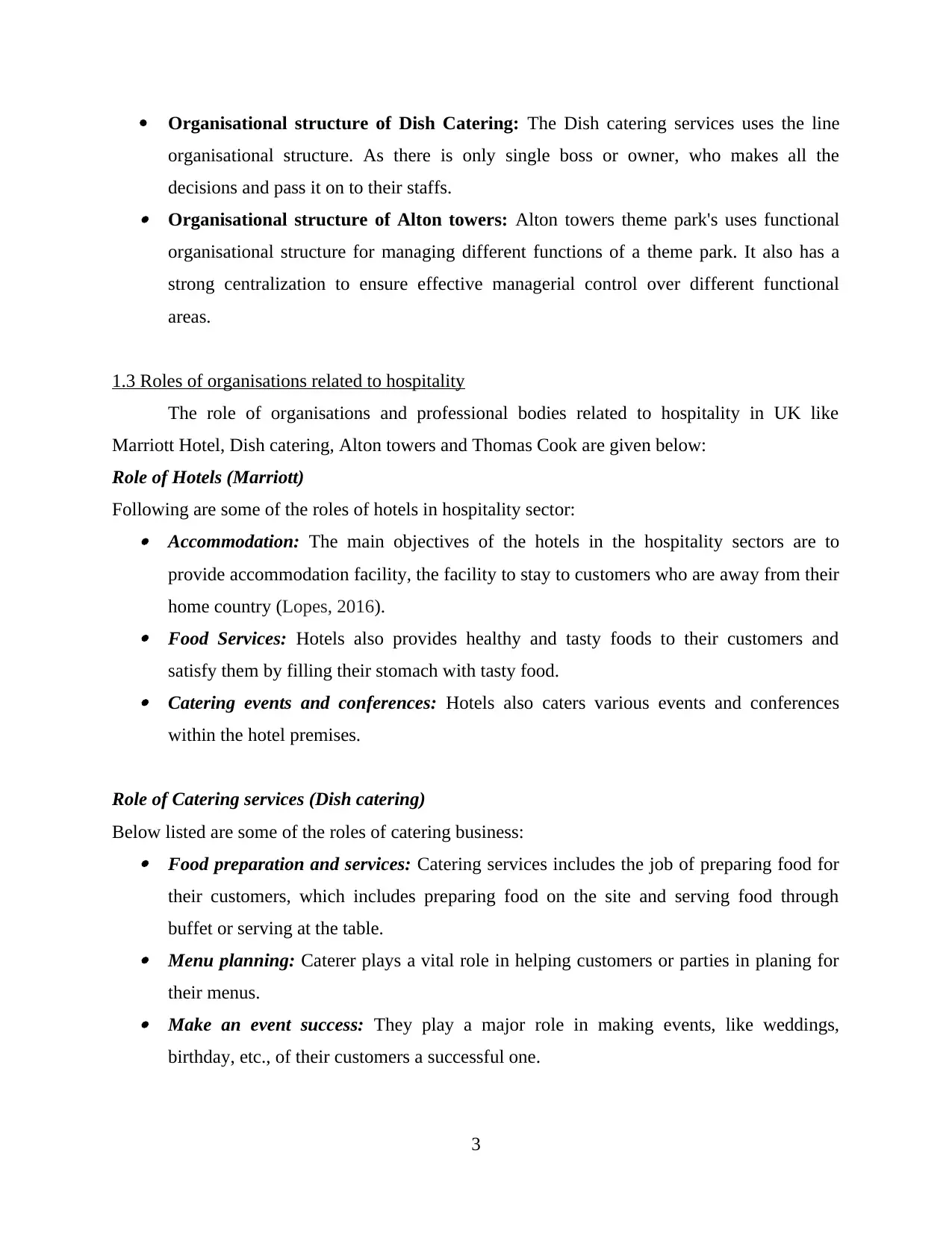
Organisational structure of Dish Catering: The Dish catering services uses the line
organisational structure. As there is only single boss or owner, who makes all the
decisions and pass it on to their staffs. Organisational structure of Alton towers: Alton towers theme park's uses functional
organisational structure for managing different functions of a theme park. It also has a
strong centralization to ensure effective managerial control over different functional
areas.
1.3 Roles of organisations related to hospitality
The role of organisations and professional bodies related to hospitality in UK like
Marriott Hotel, Dish catering, Alton towers and Thomas Cook are given below:
Role of Hotels (Marriott)
Following are some of the roles of hotels in hospitality sector: Accommodation: The main objectives of the hotels in the hospitality sectors are to
provide accommodation facility, the facility to stay to customers who are away from their
home country (Lopes, 2016). Food Services: Hotels also provides healthy and tasty foods to their customers and
satisfy them by filling their stomach with tasty food. Catering events and conferences: Hotels also caters various events and conferences
within the hotel premises.
Role of Catering services (Dish catering)
Below listed are some of the roles of catering business: Food preparation and services: Catering services includes the job of preparing food for
their customers, which includes preparing food on the site and serving food through
buffet or serving at the table. Menu planning: Caterer plays a vital role in helping customers or parties in planing for
their menus. Make an event success: They play a major role in making events, like weddings,
birthday, etc., of their customers a successful one.
3
organisational structure. As there is only single boss or owner, who makes all the
decisions and pass it on to their staffs. Organisational structure of Alton towers: Alton towers theme park's uses functional
organisational structure for managing different functions of a theme park. It also has a
strong centralization to ensure effective managerial control over different functional
areas.
1.3 Roles of organisations related to hospitality
The role of organisations and professional bodies related to hospitality in UK like
Marriott Hotel, Dish catering, Alton towers and Thomas Cook are given below:
Role of Hotels (Marriott)
Following are some of the roles of hotels in hospitality sector: Accommodation: The main objectives of the hotels in the hospitality sectors are to
provide accommodation facility, the facility to stay to customers who are away from their
home country (Lopes, 2016). Food Services: Hotels also provides healthy and tasty foods to their customers and
satisfy them by filling their stomach with tasty food. Catering events and conferences: Hotels also caters various events and conferences
within the hotel premises.
Role of Catering services (Dish catering)
Below listed are some of the roles of catering business: Food preparation and services: Catering services includes the job of preparing food for
their customers, which includes preparing food on the site and serving food through
buffet or serving at the table. Menu planning: Caterer plays a vital role in helping customers or parties in planing for
their menus. Make an event success: They play a major role in making events, like weddings,
birthday, etc., of their customers a successful one.
3
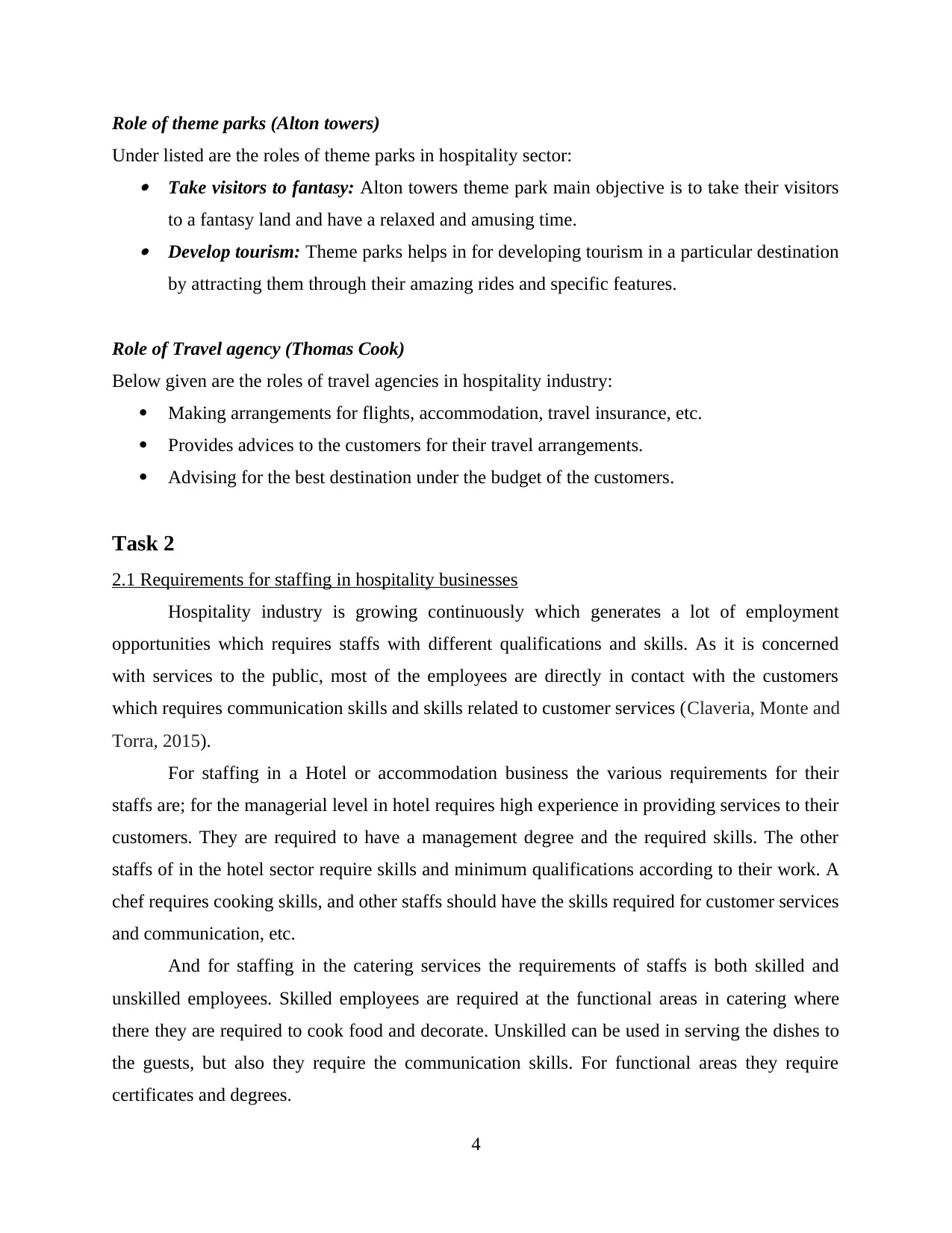
Role of theme parks (Alton towers)
Under listed are the roles of theme parks in hospitality sector: Take visitors to fantasy: Alton towers theme park main objective is to take their visitors
to a fantasy land and have a relaxed and amusing time. Develop tourism: Theme parks helps in for developing tourism in a particular destination
by attracting them through their amazing rides and specific features.
Role of Travel agency (Thomas Cook)
Below given are the roles of travel agencies in hospitality industry:
Making arrangements for flights, accommodation, travel insurance, etc.
Provides advices to the customers for their travel arrangements.
Advising for the best destination under the budget of the customers.
Task 2
2.1 Requirements for staffing in hospitality businesses
Hospitality industry is growing continuously which generates a lot of employment
opportunities which requires staffs with different qualifications and skills. As it is concerned
with services to the public, most of the employees are directly in contact with the customers
which requires communication skills and skills related to customer services (Claveria, Monte and
Torra, 2015).
For staffing in a Hotel or accommodation business the various requirements for their
staffs are; for the managerial level in hotel requires high experience in providing services to their
customers. They are required to have a management degree and the required skills. The other
staffs of in the hotel sector require skills and minimum qualifications according to their work. A
chef requires cooking skills, and other staffs should have the skills required for customer services
and communication, etc.
And for staffing in the catering services the requirements of staffs is both skilled and
unskilled employees. Skilled employees are required at the functional areas in catering where
there they are required to cook food and decorate. Unskilled can be used in serving the dishes to
the guests, but also they require the communication skills. For functional areas they require
certificates and degrees.
4
Under listed are the roles of theme parks in hospitality sector: Take visitors to fantasy: Alton towers theme park main objective is to take their visitors
to a fantasy land and have a relaxed and amusing time. Develop tourism: Theme parks helps in for developing tourism in a particular destination
by attracting them through their amazing rides and specific features.
Role of Travel agency (Thomas Cook)
Below given are the roles of travel agencies in hospitality industry:
Making arrangements for flights, accommodation, travel insurance, etc.
Provides advices to the customers for their travel arrangements.
Advising for the best destination under the budget of the customers.
Task 2
2.1 Requirements for staffing in hospitality businesses
Hospitality industry is growing continuously which generates a lot of employment
opportunities which requires staffs with different qualifications and skills. As it is concerned
with services to the public, most of the employees are directly in contact with the customers
which requires communication skills and skills related to customer services (Claveria, Monte and
Torra, 2015).
For staffing in a Hotel or accommodation business the various requirements for their
staffs are; for the managerial level in hotel requires high experience in providing services to their
customers. They are required to have a management degree and the required skills. The other
staffs of in the hotel sector require skills and minimum qualifications according to their work. A
chef requires cooking skills, and other staffs should have the skills required for customer services
and communication, etc.
And for staffing in the catering services the requirements of staffs is both skilled and
unskilled employees. Skilled employees are required at the functional areas in catering where
there they are required to cook food and decorate. Unskilled can be used in serving the dishes to
the guests, but also they require the communication skills. For functional areas they require
certificates and degrees.
4
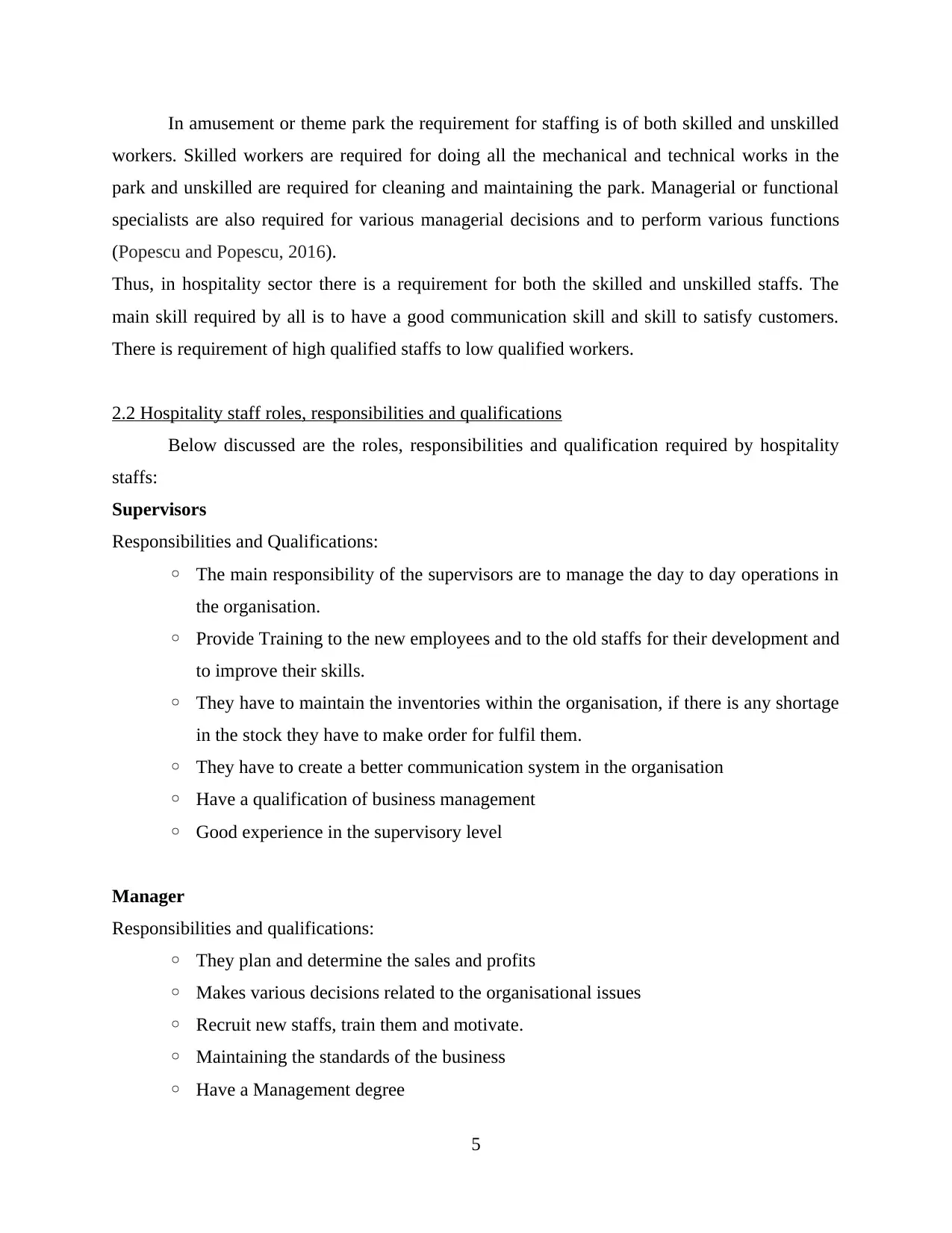
In amusement or theme park the requirement for staffing is of both skilled and unskilled
workers. Skilled workers are required for doing all the mechanical and technical works in the
park and unskilled are required for cleaning and maintaining the park. Managerial or functional
specialists are also required for various managerial decisions and to perform various functions
(Popescu and Popescu, 2016).
Thus, in hospitality sector there is a requirement for both the skilled and unskilled staffs. The
main skill required by all is to have a good communication skill and skill to satisfy customers.
There is requirement of high qualified staffs to low qualified workers.
2.2 Hospitality staff roles, responsibilities and qualifications
Below discussed are the roles, responsibilities and qualification required by hospitality
staffs:
Supervisors
Responsibilities and Qualifications:
◦ The main responsibility of the supervisors are to manage the day to day operations in
the organisation.
◦ Provide Training to the new employees and to the old staffs for their development and
to improve their skills.
◦ They have to maintain the inventories within the organisation, if there is any shortage
in the stock they have to make order for fulfil them.
◦ They have to create a better communication system in the organisation
◦ Have a qualification of business management
◦ Good experience in the supervisory level
Manager
Responsibilities and qualifications:
◦ They plan and determine the sales and profits
◦ Makes various decisions related to the organisational issues
◦ Recruit new staffs, train them and motivate.
◦ Maintaining the standards of the business
◦ Have a Management degree
5
workers. Skilled workers are required for doing all the mechanical and technical works in the
park and unskilled are required for cleaning and maintaining the park. Managerial or functional
specialists are also required for various managerial decisions and to perform various functions
(Popescu and Popescu, 2016).
Thus, in hospitality sector there is a requirement for both the skilled and unskilled staffs. The
main skill required by all is to have a good communication skill and skill to satisfy customers.
There is requirement of high qualified staffs to low qualified workers.
2.2 Hospitality staff roles, responsibilities and qualifications
Below discussed are the roles, responsibilities and qualification required by hospitality
staffs:
Supervisors
Responsibilities and Qualifications:
◦ The main responsibility of the supervisors are to manage the day to day operations in
the organisation.
◦ Provide Training to the new employees and to the old staffs for their development and
to improve their skills.
◦ They have to maintain the inventories within the organisation, if there is any shortage
in the stock they have to make order for fulfil them.
◦ They have to create a better communication system in the organisation
◦ Have a qualification of business management
◦ Good experience in the supervisory level
Manager
Responsibilities and qualifications:
◦ They plan and determine the sales and profits
◦ Makes various decisions related to the organisational issues
◦ Recruit new staffs, train them and motivate.
◦ Maintaining the standards of the business
◦ Have a Management degree
5
Paraphrase This Document
Need a fresh take? Get an instant paraphrase of this document with our AI Paraphraser
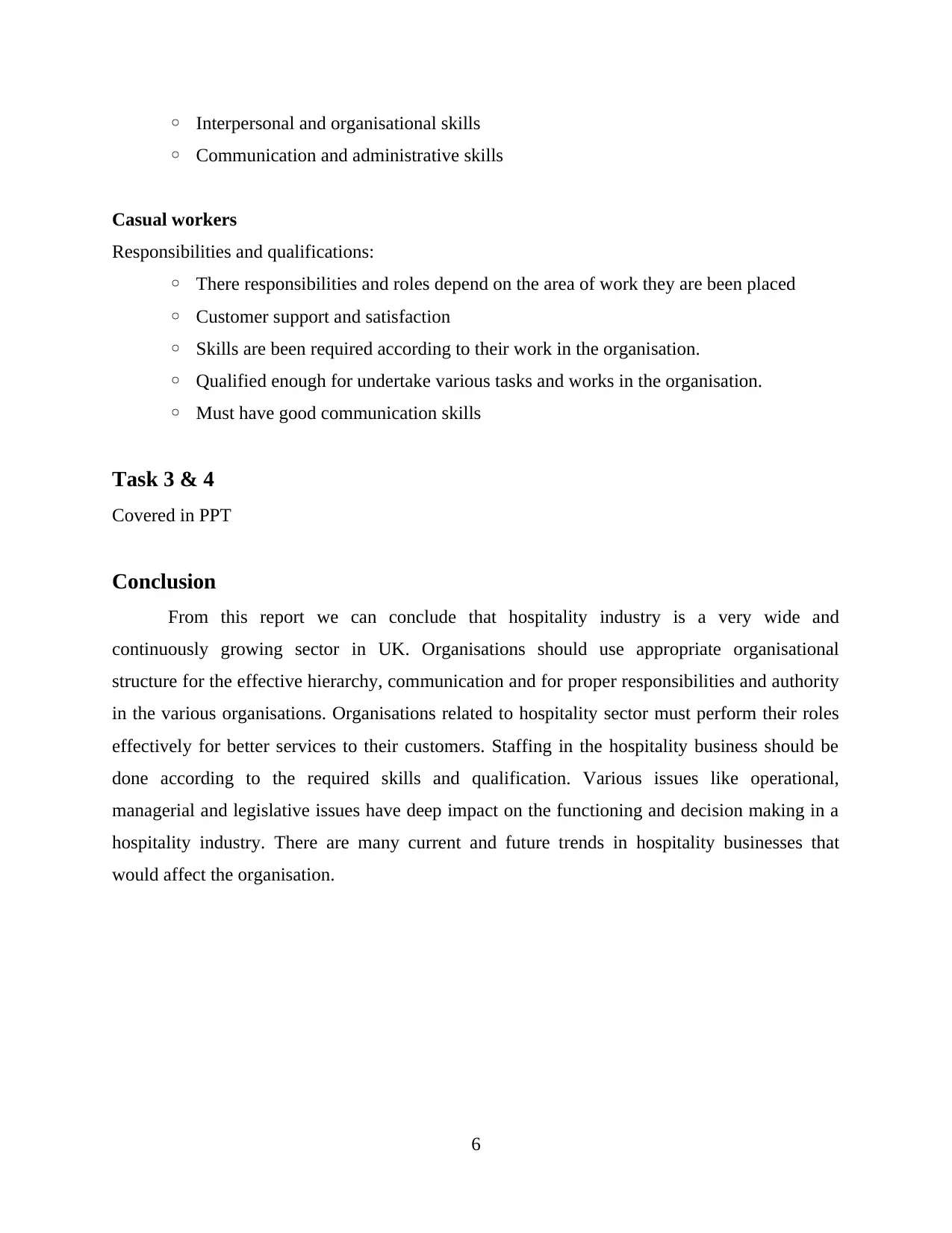
◦ Interpersonal and organisational skills
◦ Communication and administrative skills
Casual workers
Responsibilities and qualifications:
◦ There responsibilities and roles depend on the area of work they are been placed
◦ Customer support and satisfaction
◦ Skills are been required according to their work in the organisation.
◦ Qualified enough for undertake various tasks and works in the organisation.
◦ Must have good communication skills
Task 3 & 4
Covered in PPT
Conclusion
From this report we can conclude that hospitality industry is a very wide and
continuously growing sector in UK. Organisations should use appropriate organisational
structure for the effective hierarchy, communication and for proper responsibilities and authority
in the various organisations. Organisations related to hospitality sector must perform their roles
effectively for better services to their customers. Staffing in the hospitality business should be
done according to the required skills and qualification. Various issues like operational,
managerial and legislative issues have deep impact on the functioning and decision making in a
hospitality industry. There are many current and future trends in hospitality businesses that
would affect the organisation.
6
◦ Communication and administrative skills
Casual workers
Responsibilities and qualifications:
◦ There responsibilities and roles depend on the area of work they are been placed
◦ Customer support and satisfaction
◦ Skills are been required according to their work in the organisation.
◦ Qualified enough for undertake various tasks and works in the organisation.
◦ Must have good communication skills
Task 3 & 4
Covered in PPT
Conclusion
From this report we can conclude that hospitality industry is a very wide and
continuously growing sector in UK. Organisations should use appropriate organisational
structure for the effective hierarchy, communication and for proper responsibilities and authority
in the various organisations. Organisations related to hospitality sector must perform their roles
effectively for better services to their customers. Staffing in the hospitality business should be
done according to the required skills and qualification. Various issues like operational,
managerial and legislative issues have deep impact on the functioning and decision making in a
hospitality industry. There are many current and future trends in hospitality businesses that
would affect the organisation.
6
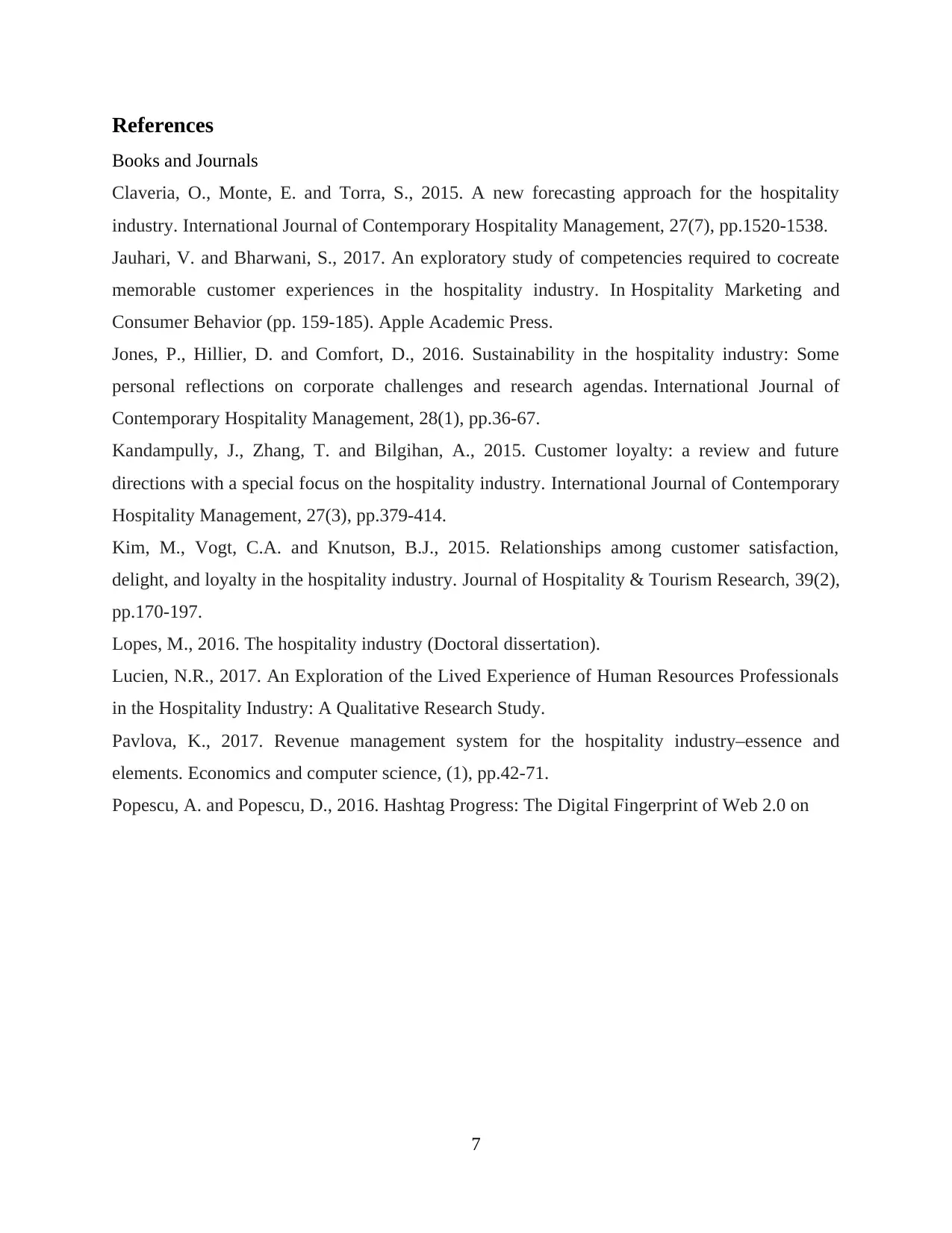
References
Books and Journals
Claveria, O., Monte, E. and Torra, S., 2015. A new forecasting approach for the hospitality
industry. International Journal of Contemporary Hospitality Management, 27(7), pp.1520-1538.
Jauhari, V. and Bharwani, S., 2017. An exploratory study of competencies required to cocreate
memorable customer experiences in the hospitality industry. In Hospitality Marketing and
Consumer Behavior (pp. 159-185). Apple Academic Press.
Jones, P., Hillier, D. and Comfort, D., 2016. Sustainability in the hospitality industry: Some
personal reflections on corporate challenges and research agendas. International Journal of
Contemporary Hospitality Management, 28(1), pp.36-67.
Kandampully, J., Zhang, T. and Bilgihan, A., 2015. Customer loyalty: a review and future
directions with a special focus on the hospitality industry. International Journal of Contemporary
Hospitality Management, 27(3), pp.379-414.
Kim, M., Vogt, C.A. and Knutson, B.J., 2015. Relationships among customer satisfaction,
delight, and loyalty in the hospitality industry. Journal of Hospitality & Tourism Research, 39(2),
pp.170-197.
Lopes, M., 2016. The hospitality industry (Doctoral dissertation).
Lucien, N.R., 2017. An Exploration of the Lived Experience of Human Resources Professionals
in the Hospitality Industry: A Qualitative Research Study.
Pavlova, K., 2017. Revenue management system for the hospitality industry–essence and
elements. Economics and computer science, (1), pp.42-71.
Popescu, A. and Popescu, D., 2016. Hashtag Progress: The Digital Fingerprint of Web 2.0 on
7
Books and Journals
Claveria, O., Monte, E. and Torra, S., 2015. A new forecasting approach for the hospitality
industry. International Journal of Contemporary Hospitality Management, 27(7), pp.1520-1538.
Jauhari, V. and Bharwani, S., 2017. An exploratory study of competencies required to cocreate
memorable customer experiences in the hospitality industry. In Hospitality Marketing and
Consumer Behavior (pp. 159-185). Apple Academic Press.
Jones, P., Hillier, D. and Comfort, D., 2016. Sustainability in the hospitality industry: Some
personal reflections on corporate challenges and research agendas. International Journal of
Contemporary Hospitality Management, 28(1), pp.36-67.
Kandampully, J., Zhang, T. and Bilgihan, A., 2015. Customer loyalty: a review and future
directions with a special focus on the hospitality industry. International Journal of Contemporary
Hospitality Management, 27(3), pp.379-414.
Kim, M., Vogt, C.A. and Knutson, B.J., 2015. Relationships among customer satisfaction,
delight, and loyalty in the hospitality industry. Journal of Hospitality & Tourism Research, 39(2),
pp.170-197.
Lopes, M., 2016. The hospitality industry (Doctoral dissertation).
Lucien, N.R., 2017. An Exploration of the Lived Experience of Human Resources Professionals
in the Hospitality Industry: A Qualitative Research Study.
Pavlova, K., 2017. Revenue management system for the hospitality industry–essence and
elements. Economics and computer science, (1), pp.42-71.
Popescu, A. and Popescu, D., 2016. Hashtag Progress: The Digital Fingerprint of Web 2.0 on
7
1 out of 9
Related Documents
Your All-in-One AI-Powered Toolkit for Academic Success.
+13062052269
info@desklib.com
Available 24*7 on WhatsApp / Email
![[object Object]](/_next/static/media/star-bottom.7253800d.svg)
Unlock your academic potential
© 2024 | Zucol Services PVT LTD | All rights reserved.





